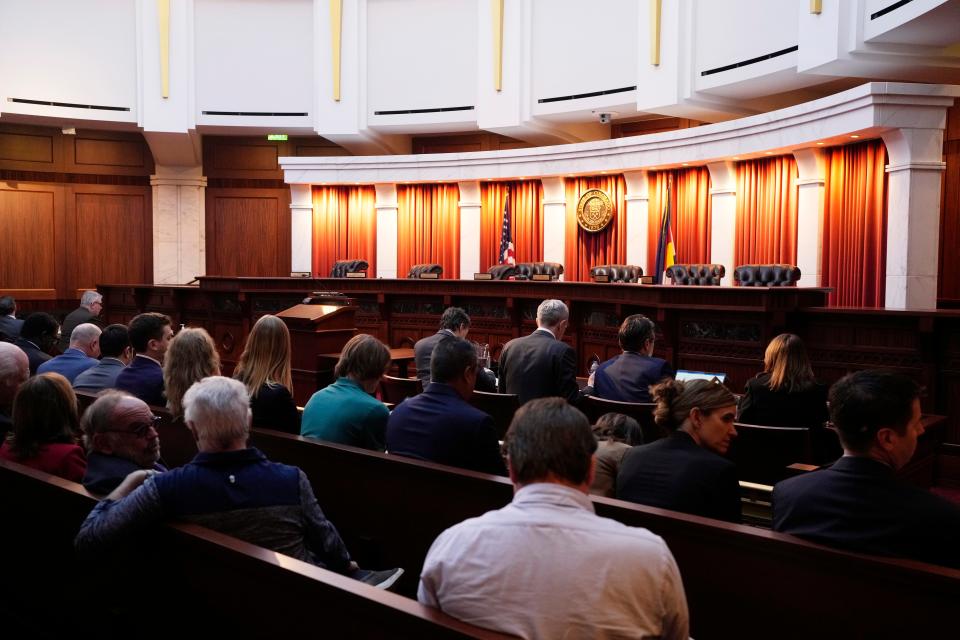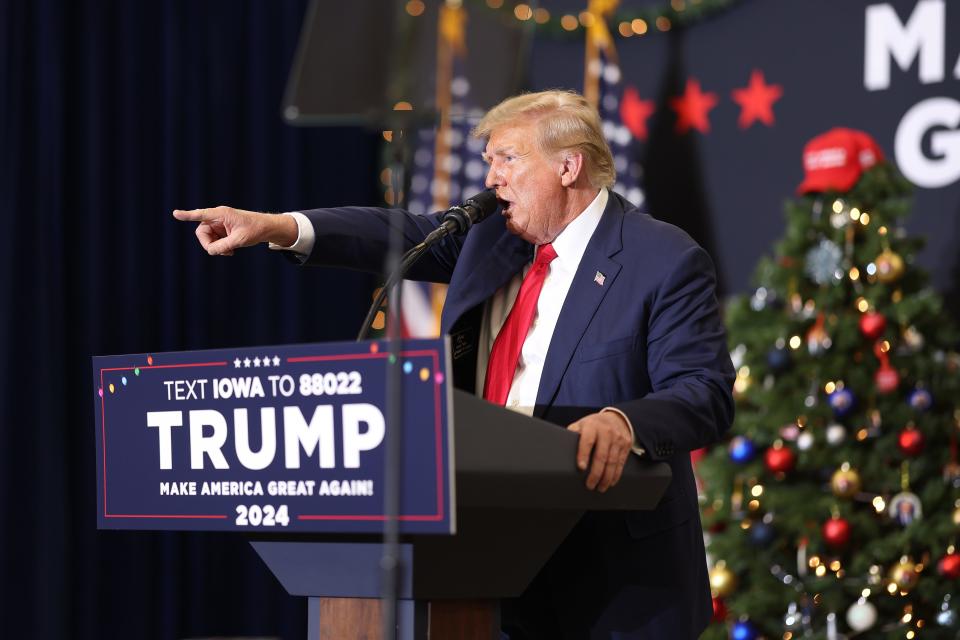Lawyer who filed first challenge to Trump eligibility doubts Supreme Court will disqualify him
- Oops!Something went wrong.Please try again later.
The Palm Beach County lawyer who filed the first — albeit unsuccessful — legal challenge to Donald Trump's presidential candidacy is not optimistic about the viability of a Colorado court ruling that ostensibly validated his argument.
Lawrence Caplan said in an interview Wednesday, Dec. 20, that he expects the U.S. Supreme Court will ultimately rule in Trump's favor and allow him to remain on the ballot through the primary season, and into the general election if he is the 2024 Republican presidential nominee.
"The Supreme Court will have to deal with it. They can't avoid it," said Caplan, who in August filed a federal lawsuit in Fort Lauderdale citing the 14th Amendment to declare Trump ineligible ahead of next March's presidential primary. "But I would be shocked if they upheld the Colorado Supreme Court's decision."

While a federal judge almost immediately tossed Caplan's complaint, the Colorado Supreme Court's justices on Tuesday, Dec. 19, agreed with a similar argument to Caplan's in ruling Trump is "disqualified from holding the office" of president under the Constitution's 14th Amendment. The amendment, ratified in 1868 after the Civil War, includes a "disqualification clause" for those who engage in insurrections and rebellion against the United States.
As a result, the Colorado court held, it "would be a wrongful act under the Election Code for the Colorado Secretary of State to list him as a candidate on the presidential primary ballot."
Accusation Trump engaged in insurrection stems from attack on U.S. Capitol
The allegation that Trump committed insurrection stems from the Jan. 6, 2021, violence at the U.S. Capitol. The Jan. 6 congressional committee that investigated the attack accused Trump of four crimes, including assisting an insurrection in an attempted coup to stop the legitimate and lawful transfer of power to President Joe Biden.
Applying the 14th Amendment's disqualification rule to Trump gained momentum this past summer when legal and constitutional scholars, including from conservative corners, advocated for it.
All that being said, constitutional scholar Kevin Wagner said concluding that Trump engaged in insurrection is far from clear, largely because the 14th Amendment is fairly vague.
"The terms of the insurrection act leave a lot to interpretation," said Wagner, associate dean for research and creative activities at Florida Atlantic University. "There's no definitional provision in the Constitution, so a lot of that is left up to the courts or the political branches to interpret."
For example, Wagner said, the amendment does not explicitly define what constitutes an insurrection or rebellion. Nor does it detail what amounts to aid and comfort to an insurrection, he added.
While the Colorado justices deemed Trump's actions amounted to insurrection, Wagner said it's a dicey assumption to conclude other courts will do so as well.
"It's a difficult question to answer," he said.
U.S. Supreme Court likely to decide if Trump can run for president
But it's an important one for the U.S. Supreme Court to determine conclusively, said David Becker, executive director and founder of the nonpartisan, nonprofit Center for Election Innovation & Research.
"It is crucial for all Americans that the issue of Donald Trump's eligibility be resolved as soon as possible, whether or not he is a qualified candidate for the presidency," Becker said.
Becker pointed out that Republican Party officials and voters would be best served if the question is settled before they start casting votes, first during the Iowa caucuses scheduled for Jan. 15. In addition, election officials in the 50 states, the District of Columbia and the territories also need an answer in due time so they can provide voters with accurate ballots.

Although there are various ways to provide a clear answer for all, including an action by Congress, the optimal path is through the high court, he said.
"I will tell you that I believe that this matter is best resolved if the U.S. Supreme Court rules on it clearly, and definitively and quickly," Becker said. "And does so in plenty of time so all the parties can prepare accordingly."
Becker added that the entire legal debate over Trump and the 14th Amendment is "unprecedented," even though the high court did make a decisive ruling in the 2000 presidential election by striking down the Florida Supreme Court's own ruling on ballot counting. That controversial decision ended the recounts and paved the way for George W. Bush to win the state's electoral votes — and the presidency.
But Becker cautioned Bush v. Gore will have no bearing on the challenges to Trump's eligibility, despite the case also being decided on 14th Amendment grounds.
Becker said Bush v. Gore applied the amendment's equal protection clause to the way counties treated ballot counting, not the section on insurrection. Plus, he pointed out the Bush v. Gore ruling included "an unusual piece of language" that "expressly held that this was not to serve as precedent" and the 5-4 ruling only applied to the 2000 election case.
Trump and the 14th Amendment: Palm Beach County lawyer files legal challenge to disqualify Trump from 2024 presidential race
"I think it is very unlikely Bush v. Gore would have any application to this," he said of the Colorado case.
What seems very likely is that the justices will be presented with a final say on Trump's eligibility. Just hours after the Colorado decision was announced, Trump's campaign said it would appeal the ruling at the nation's highest court.
"The Colorado Supreme Court issued a completely flawed decision tonight and we will swiftly file an appeal to the United States Supreme Court and a concurrent request for a stay of this deeply undemocratic decision," read a statement by Trump campaign spokesman Steven Cheung. "We have full confidence that the U.S. Supreme Court will quickly rule in our favor and finally put an end to these unAmerican lawsuits.”
Appealing Colorado Supreme Court is high stakes for Trump and his campaign
An appeal by Trump would be among the highest stakes challenges ever to land at the U.S. Supreme Court. But banking on the high court to keep his name on the ballot in Colorado — and everywhere else — could be a risky move for Trump's 2024 presidential campaign.
While a favorable ruling from the American high court would secure his name on the ballot in the Mile High State, and across the country, an adverse ruling would be game over for Trump's 2024 presidential comeback.
Trump did not win Colorado's contested primary in 2016, and lost the state's electoral votes both in 2016 and 2020. Up until Tuesday, Trump had garnered favorable eligibility rulings from courts and decisions by election officials in key battleground states that might be jeopardized if he should lose at the U.S. Supreme Court.
For example, in Michigan, a state court judge ruled Trump should stay on the ballot in November, while the Minnesota Supreme Court tossed a challenge against him. In his home state of Florida, a federal judge also dismissed the challenge filed by Caplan in August.
But FAU's Wagner said the former president might not have a choice but to appeal.
Politically speaking, Wagner noted that Trump's brand depends on him being seen as a brawler, so letting the Colorado decision stand unanswered would look as if "he is conceding." In addition, allowing the Colorado ruling to stand would allow the ruling to become a precedent to be embraced as a "reliable authority for other courts" and "even a persuasive authority" for other states.
Finally, the Colorado justices also based their ruling on a finding that Trump engaged in insurrection, thus making the 14th Amendment applicable.
"The logic about whether or not the former president engaged in insurrection, which is what they found, I'm not sure that the former president can allow that to stand," Wagner said.
Caplan, the Boynton Beach attorney whose legal filing preceded dozens of other challenges, said he now doubts the high court wants to end up "being blamed" for deciding a presidential election, as the justices found in 2000. The high court may argue that the 14th Amendment's insurrection clause was aimed at Confederates and "was not designed to be a catch-all going forward 150 years later," he added.
"I'm not saying they are right. I'm saying that's what they are going to decide," he said.
Despite his pessimism, Caplan said he stands by the decision he made in August when he first filed his challenge.
"I don't have any regrets," he said. "I still feel that the reason that I filed it was valid."
Antonio Fins is a politics and business editor at The Palm Beach Post, part of the USA TODAY Florida Network. You can reach him at afins@pbpost.com. Help support our journalism. Subscribe today.
This article originally appeared on Palm Beach Post: Lawyer who sued to disqualify Trump candidacy doubts effort will succeed

